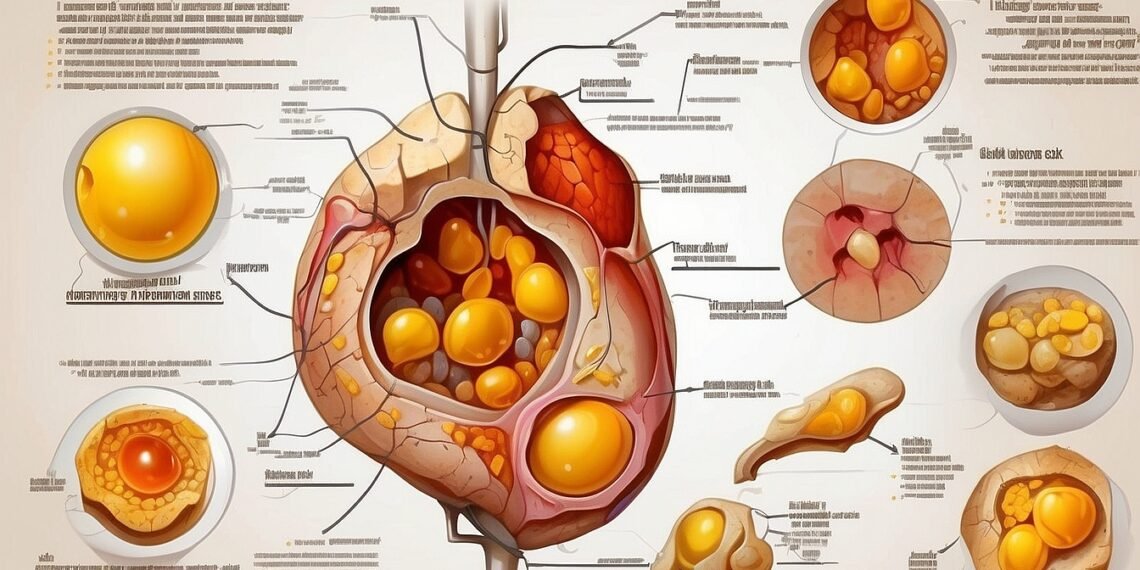Yes, gallstones can indeed cause back pain, particularly between the shoulder blades or in the upper right portion of the back. This pain arises when a stone blocks a bile duct, leading to pressure and inflammation, and the discomfort can radiate to nearby areas.
Here’s a deeper exploration of the mechanisms, treatment options, definitions, and when to seek medical attention:
Direct and Indirect Mechanisms:
- Blocked bile duct: When a gallstone lodges in a bile duct, it can cause inflammation and pressure buildup, resulting in pain in the upper abdomen and potentially radiating to the back, especially between the shoulder blades or the upper right side.
- Referred pain: Pain from the inflamed bile duct and surrounding tissues can be referred to other areas, including the back, through shared nerve pathways.
- Muscle tension: The discomfort from the gallstones can trigger muscle tension in the back and chest as the body tries to protect itself, leading to additional pain.
Treatment Options:
- Pain management: Over-the-counter pain relievers like acetaminophen or ibuprofen can provide temporary relief from the pain.
- Dietary changes: Avoiding fatty and greasy foods can help reduce the production of bile and decrease the risk of gallstone formation.
- Ursodeoxycholic acid (UDCA): This medication can help dissolve cholesterol gallstones slowly but may take several months to be effective.
- Endoscopic retrograde cholangiopancreatography (ERCP): This procedure involves using an endoscope to remove the stone from the bile duct.
- Laparoscopic cholecystectomy: This surgery removes the gallbladder entirely, permanently eliminating the risk of future gallstones.
Definitions:
- Gallstones: Hardened deposits that form in the gallbladder, composed primarily of cholesterol, bilirubin, and calcium salts.
- Bile duct: A tube that carries bile from the liver and gallbladder to the small intestine.
- Inflammation: The body’s response to injury or irritation, characterized by swelling, redness, and pain.
- Referred pain: Pain that is felt in an area other than the source of the pain.
- Muscle tension: Involuntary contraction of muscles.
When to See a Doctor:
It is important to see a doctor if you experience any of the following:
- Severe back pain that is not relieved by home treatment
- Back pain that is accompanied by other symptoms, such as fever, nausea, vomiting, or jaundice
- Back pain that is getting worse
- Back pain that interferes with your daily activities
- You are concerned about the possibility of complications from gallstones
Additional Resources:
- National Institute of Diabetes and Digestive and Kidney Diseases: https://www.niddk.nih.gov/
- Mayo Clinic: https://www.mayoclinic.org/diseases-conditions/gallstones/symptoms-causes/syc-20354214
- American College of Gastroenterology: https://gi.org/
- YouTube video on gallstones and back pain: https://m.youtube.com/watch?v=6U1Tn-y3EOA
Remember: While back pain can be a symptom of gallstones, it is important to rule out other potential causes. Consult your doctor for a proper diagnosis and to receive the most appropriate treatment plan for your specific situation.
Follow-up Questions about Gallstones and Back Pain:
Specifics of Pain:
- What type of back pain do you experience (e.g., sharp, dull ache, burning)?
- Where in your back do you feel the pain (e.g., between shoulder blades, upper right side)?
- Does the pain come and go, or is it constant?
- Does the pain radiate anywhere else (e.g., chest, shoulder)?
- Does the back pain worsen with specific movements or activities (e.g., eating fatty foods, bending over)?
- What makes the back pain feel better or worse?
Relationships:
- Does the back pain interfere with your daily activities, work, or social life?
- Has the back pain affected your sleep or mood?
- Has the back pain strained your relationships with family or friends?
- Have you discussed your concerns about the back pain with your partner or loved ones?
- Have you found support groups or online communities helpful in dealing with the pain and discomfort?
Treatment and Management:
- Have you tried any home remedies or over-the-counter medications to manage the pain?
- Are you currently taking any medications or undergoing any treatments for gallstones?
- Have you discussed treatment options for gallstones with your doctor?
- are you considering any specific treatment options (e.g., dietary changes, medication, surgery)?
- Are you concerned about the side effects or risks of any potential treatments?
Other Potential Causes:
- Have you been diagnosed with any other medical conditions that could contribute to back pain (e.g., muscle strain, pancreatitis)?
- Have you recently experienced any injuries or falls?
- Do you have any other symptoms besides back pain that could be related to gallstones or another medical condition (e.g., nausea, vomiting, jaundice, fever)?
- Have you discussed the possibility of other causes of the back pain with your doctor?
- Have you had any tests or examinations done to investigate the cause of the back pain?
Remember: These are just some examples of follow-up questions that people might ask about gallstones and back pain. The specific questions you ask will vary depending on your individual situation and concerns.

